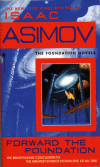I’ve read quite a few reviews of this novel and many people are disappointed because it does not tie up the questions left unanswered at the end of Foundation and Earth. Much of this disappointment comes from the fact that Forward the Foundation is the last book in the series written by Asimov just before his death. I think that the disappointed fans were looking for answers in the wrong places. This novel simply gives us a closer look at Hari Seldon and the progress of the psychohistory project at Streeling University.
If you just plan on learning more about Hari and his family while he works out the details of psychohistory, you won’t be disappointed. In many ways this book makes more sense read in chronological order rather than by publication date. There are some pretty big spoilers for the later Foundation books, but as I said in my review for Prelude, it just gives me a different perspective. What this novel does not do is give a real sense of closure to the series. I don’t think that Asimov had those intentions for this novel anyway. Instead, he shows the reader how psychohistory was developed.
Forward the Foundation is broken up into four novellas and an epilogue. The novel starts out about eight years after the end of Prelude to Foundation. In part 1, ‘Eto Dermzel’, Hari Seldon must deal with a charismatic leader named Jo-Jo Joranum which is attempting to disrupt Emperor Cleon’s rule. Cleon is convinced that Hari can now make predictions using psychohistory, so commands Hari to resolve the problem. Unfortunately, psychohistory is nowhere near this level of progress, so Hari must find another way. I was amused by Hari’s solution, and will leave that up to you readers to discover. The subsequent parts focus on Cleon I, Dors Venabili, and Wanda Seldon (Hari’s Granddaughter).
The novella format reminded me a bit of The Currents of Space. Each part starts roughly 10 years after the previous one ends, but shortly after starting a new part, Hari Seldon reminisces about the past through flashbacks. After some exposition the story shifts back to present time. This approach is more straightforward than in The Currents of Space, so figuring out which time frame the story is in doesn’t get confusing. I normally just read a few chapters of a book at a time, but I found myself plowing through each section within the same day.
Throughout this book we see the various signs of decay Hari has predicted as they become more prominent. Political instability, crime, mechanical failures, lost technology, and a troubled economy are just a few problems that the Empire is facing. Unfortunately since Hari Seldon is known to have predicted the decline, his popularity has gone down. He loses government funding and must find other ways to keep the psychohistory from hitting a dead end. Aside from searching for funds, Hari must select his successors to keep the project going after his death.
This book isn’t only about the decline of the Empire, but also of Hari Seldon. Since the book covers bout 30 years, starting out with Hari at the age of 40, we see his physical and emotional deterioration. Some of his physical problems could be attributed to the decline in heath care technology, but much of his emotional problems come from stress of the psychohistory project and family issues. The ending is a bit depressing, but at least there is a hope yet for psychohistory and the future of the humanity.
I’ve seen many reviews refer to this book as sort of a hidden autobiography, since Asimov was aware that his days were numbered when he wrote this. Supposedly there are a lot of qualities of himself that Asimov inserted into Hari Seldon’s character development. I can’t really compare Isaac Asimov to Hari Seldon because I shamefully haven’t ready any of his autobiographies yet. I plan on doing so after this project and will jump back to do some comparison using my reading notes.

I quite liked the novel but I would recommend this to be read at the end of the Foundation Series. Otherwise the entire build-up of ‘Second Foundation’ as well as ‘Foundation’s edge’ will be lost.
Depending on the experience you want, it does ruin some of the mystery of the other novels that were published earlier. I have read them in publish order and chronological and liked it both times. Unfortunately, I haven’t heard from anyone that read it through chronologically the first time to hear their opinion.